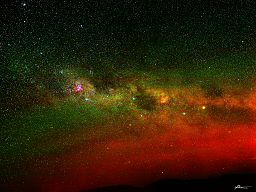Who Cares About Extraterrestrials?
 Author friend and fellow blogger Mike Duran recently posted part two of his series on extraterrestrials and evangelicals. Honestly my first reaction was, who cares?
Author friend and fellow blogger Mike Duran recently posted part two of his series on extraterrestrials and evangelicals. Honestly my first reaction was, who cares?
Disclaimer: I’m not a science fiction person. On top of that I don’t see the value in speculation about things we cannot know.
Oh, sure, I do look at Scripture and form my pet theories on some of the things God did not detail for us, and I suppose that’s what science fictionists do the same, only with science instead of Scripture. For whatever reason, extrapolating from what we know about science to what might exist has never appealed to me.
Consequently, I’m aware that my “Who cares” is probably not reflective of most people. It appears there is growing interest in the question of whether or not we humans are “alone in the universe.”
Well, as a Christian, I’ve never wondered whether we are alone because clearly the answer is no. God is with us. Further, there’s a whole invisible realm—“things in heaven,” as Colossians puts it—in which angelic hosts wage war and do whatever else angelic hosts do. So, “alone” we are not.
Of course science people are not asking about spiritual beings; they want to know if there are other physical beings with intelligence inhabiting some corner of the universe. Blogger John Sears posts a compelling argument that there is no evidence for extraterrestrial life in the universe. At the same time, he gives credence to the number of unexplained encounters, beyond the hoaxes and crazies, with flying saucers and/or other beings.
How can both be true?
My first thought is, who cares?
I know. It’s not a very writerly response. I can’t explain my lack of curiosity about life beyond this world. I continue to think that pursuit of the subject is futile because the truth of the matter is outside the ability of man to determine—so what’s the point? Plus, believing as I do that there is a spiritual realm, the encounters people report seem less likely to be with physical beings coming from another part of the universe and more likely to be manifestations of angelic or demonic beings. But that too is unprovable.
Mike Duran’s question, fueled by an article he read, “Did Jesus Save the Klingons?” is related to the spiritual ramifications of the existence of life on earth. Could those beings (creatures, aliens, extraterrestrials) have a recognizable relationship with God as we have?
I’m sure many will consider it blind faith on my part, but I have no doubt that if God placed other life in the universe, He has a plan that is just as good for them and for us as is the one He set in motion directly involving us.
Regardless of my thoughts on the matter, apparently there has been increasing interest in the possibility of extraterrestrial life and its ramifications on religion in general and Christianity in particular (see for example this article and this one).
I certainly have no problem with people who write science fiction. I consider it to be a type of fantasy, though. Yes, I realize that some of the science fiction of the past actually proved to be somewhat prophetic. The same can be said about the futuristic dystopian fiction of the past such as 1984 and Brave New World.
Those stories seem different, however. They were about human inventions or advancing technology or changes in society—things within the inventive capacity of humans or the resulting consequences of our development.
Stories about extraterrestrials seem to have a much less likelihood of being prophetic because the existence or nonexistence of other beings in the universe is out of our control. Hence, in my view, the speculation of such is more comparable to fantasy than to standard science fiction.
 C. S. Lewis’s space trilogy, for instance, postulates life on other planets, but it has little feel of the prophetic, though it rings true as commentary on human society.
C. S. Lewis’s space trilogy, for instance, postulates life on other planets, but it has little feel of the prophetic, though it rings true as commentary on human society.
I can enjoy stories of a similar nature such as those by Kerry Nietz (Dark Trench saga—A Star Curiously Singing, The Superlative Stream, and Freeheads) or Michelle Levigne (The Commonwealth Universe—Azuli Eyes, Scouts Pride and some twenty other titles), but a discussion about the actual existence of extraterrestrials, my eyes glaze over. The speculation on the subject is nothing more than guesswork, so I don’t know why I should care.
So what have I missed? Why should Christians, writers, speculative readers care about what people say about the possibility of extraterrestrial life?










































We should care first because aliens are one of the most consistently occurring genre expectations in science fiction. There are some sci fi readers that read science fiction for aliens above all else.
Second, we should care because it is a tremendous opportunity to showcase the intellectual implications of our worldview. Aliens that are or are not sinners, that can or cannot become Christians, who are inherently different as purposefully designed by God than aliens are if just a product of sheer randomness (even if it is imagined God uses evolution as the instrument to bring about that design), let us show very clearly what it means to be Christian and think about such things.
The fantasy equivalent to aliens is magic in this regard. Can you have fantasy without magic? Sure, but it’s unusual. And how a Christian deals with magic speaks volumes about what it is to be a Christian fantasy writer–just as how aliens are dealt with speaks volumes about what it is to be a Christian science fiction writer.
That your reaction to aliens is “who cares” is really an indicator to me that you just aren’t a science fiction writer. But you already said that very plainly.
But someone who is a science fiction writer by nature WILL care. At least I believe so…
There is some scifi without aliens (Firefly comes to mind), but it is such a point in most scifi that it does seem weird to leave it out.
Rebecca,
I haven’t read Mike Duran’s article although questions that you cite are pertinent to the whole discussion. It’s something I thought about as far back as 1984 when I tried to explain an idea for a novel to an army buddy that had behind it the question, If there are extra-terrestrials, what is their relationship to God? He was not a Christian. We had a common interest in writing as well spending the weekend watching rented movies in a cheap motel in Buena Vista, AZ to get away from the training environment at Ft. Huachuca (“The World According to Garp” was my favorite). Besides, the posing of such a question allowed me to bring the gospel in, so it quite delightfully killed two birds with one stone.
I’ve written an article, The Question of Extra-Terrestrial Intelligence Within a Biblical World-View that you might be interested in. The question that is the driving force behind my novel, The Oerken Tree (Part 1 of a trilogy and more or less a teen fantasy without the wizards, witches, dragons, and magic) is, Assuming God created intelligent life in the rest of the universe, and assuming they are not fallen in the same way earth-dwellers are fallen, what effect does the curse of Adam have on them and their world?
That has some serious implications, and I suspect that some of my fellow Calvinists might squirm at what came out of it. But hey, they’re extra-terrestrials, after all.
I think we miss the point a bit when we worry about whether there really are aliens out there or not. I thoroughly enjoy reading science fiction and have even written a science fiction novel and I am half way through the sequel, but that doesn’t mean that I actually BELIEVE aliens exist or what their state of salvation might be. I read science fiction because the impossible becomes possible in those stories and this amazing sense of the possible is what I find entertaining.
But while I read stories about aliens, my wife reads romances and murder mysteries, and my daughter reads just about anything (currently teen dystopias), not because they might be true, but because we each enjoy a good story. All good fiction, Christian or secular, is designed to shed light on the human condition and Christian fiction should shed His light on our condition, whether it be through aliens, dinosaurs, or even dragons. As long as a Christian author tells God’s truth in his story then the medium is irrelevant, as long as secular, satanic, or humanist principles are not condoned or proselytized.
As to where aliens fit into God’s plan for Earth and the fall of Adam, I think that is a matter for each writer to decide based on their understanding of the Word of God. I think that sometimes people take the little side arguments like this a little too seriously. Fiction is for entertainment and perhaps a life lesson or two, the Bible is for spiritual teaching and correction. Let’s not confuse the two.
I’m amused that in the midst of saying multiple times you don’t care about aliens, you took the time to write an entire blog post (containing a lot of links about the topic you obviously at least glanced at) about the subject. It appears you care that others care about it.
Whether or not I believe aliens are a realistic possibility in our world, they do belong in the science fiction genre (most of the time). Generally, alien encounters happen inside a story with space travel, spacetime manipulation, astronomy, and other science-related subjects. Using these to speculate about the future or the alternate present is what sci-fi is all about. They usually occur with Earth somewhere in the story’s geography (which fantasy doesn’t unless it’s urban or historical), and there’s some kind of scientific explanation for them. (This can include evolution, first because it’s all speculation anyway, and second because genres aren’t defined by Christian criteria.)
I’m not sure I’ll ever write science fiction with sentient aliens, but I think they can be used to reveal many truths in new ways. Mr. Spock helped us understand what it means to be human, for example.
If you enjoy fantasy instead of sci-fi like you said, why classify aliens (which you’re not interested in anyway) in the genre you enjoy? Leave them where people like reading about them.
Some good points here, Keith, and I agree with you more than disagree. The thing is, from the articles I read, there are people who believe extraterrestrials aren’t science fiction. They fully believe they are real and we just have not yet made contact. The question, then, is this: when we make contact, what does that do to your religion?
Of course that “when” is the point of debate. Should it be “if”? But either way, does it matter?
I can see reading science fiction with aliens in the same way one reads fantasy. That makes sense. But that some people read it as if it is prophetic . . . yes, I think we should care about that and examine it in light of Scripture. But the speculation about aliens seems so unknowable, so whatever we say seems little more than man-made thinking.
But I could be wrong. I haven’t studied Scripture with extraterrestrials in mind! 😉
Becky
Jeff Gerke has an ebook out talking about this right now. It’s free for a couple of days.
http://www.amazon.com/UFOs-Christian-Worldview-Jeff-Gerke-ebook/dp/B00O22X9AK/ref=sr_1_1?s=digital-text&ie=UTF8&qid=1414718594&sr=1-1&keywords=UFOs+and+the+Christian+Worldview